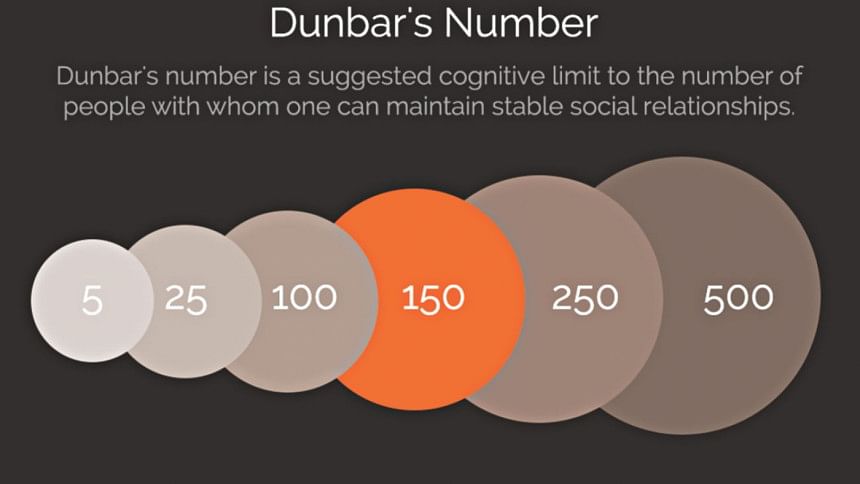You Only Care about 150 People

Ever wonder why it's so hard to keep caring about everyone you know? The classmate who used to be your best friend left town, and now you two don't even talk. Or maybe, the uncle, who used to be your favourite, barely ever crosses your thoughts. This sort of thing can be explained by Dunbar's Number.
In the 1990s, British anthropologist Robin Dunbar first suggested that there is a limit to how many people we can maintain a stable social relationship with. That number, Dunbar's Number, is around 150. Other researches placed the number between 100 and 250.
For monkeys, who have smaller brains than us, the number is around 50. Dunbar's number was found through research on primate brains, and researchers found that they could predict the group size of the species with stunning accuracy just from analysing the brain.
Dunbar's number has fascinating implications. Below are some of them:
* Because we can care about such a limited number of people, we prioritise. This number is the reason why we drift apart from those who were once so important.
* This is why those who can remember everyone's names and keep up with a lot of acquaintances are so rare. Their brains are literally wired differently.
* It shows why the death of a friend would hurt you more than a group of school kids dying in an accident. It's not just because you didn't know them. Those people were outside your "sphere of care".
* Dunbar's number is the reason why we resort to simplifying every issue into an "us vs. them" theme. It's also the reason behind us grouping up with a certain number of people in any setting – social cliques, friend groups and such. Our brains cannot handle more people than that.
* Many of us would harm people outside our 150 to help those within it. That explains a lot of criminal behaviour.
* The low number of people we can stably care about is one of the reasons behind us breaking into families as a social unit.
* Speaking of society, this is why being confined within the rules and regulations of one bothers us so much. Those rules were made so you would get along with people you really don't care about. It can understandably be annoying.
* This is also probably why modern society is worse in the behaviour department. Due to urbanisation, improvements in communication technology and such, we are forced to interact with much more people than we care to. That naturally gives birth to rude behaviour and the general air of unpleasantness everywhere.
So what can we take from knowing all this? Let's check:
* Most of us are horrible monsters caring about a very tiny number of people.
* Not caring about others is how we end up inflicting trauma on others. It can't be changed without conscious effort.
Let's make that extra effort to make the world a bit better. Who knows, by improving the lives of those outside your spheres of care, you might end up helping those inside it too.
Novo Manzoor is an athlete. He surfs the web all day. You can reach him at: [email protected]

 For all latest news, follow The Daily Star's Google News channel.
For all latest news, follow The Daily Star's Google News channel. 



Comments